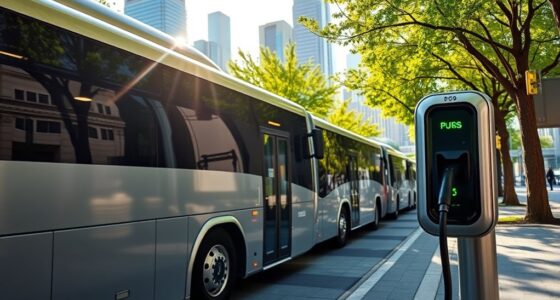If you’re weighing a vintage VW bus against a modern camper van, consider your budget, reliability, and maintenance efforts. Vintage models usually cost less upfront and offer nostalgic charm but demand frequent repairs and sourcing rare parts. Modern camper vans have higher initial prices but provide better fuel economy, tech features, and fewer headaches. If you want to explore the true costs associated with each option and discover which suits your adventuring style, continue to explore the details.
Key Takeaways
- Vintage VW buses have lower upfront costs but higher ongoing maintenance expenses due to frequent repairs.
- Modern camper vans cost more initially but offer better fuel economy and integrated systems that reduce long-term costs.
- Classic VW buses require mechanical skills for repairs, while modern vans feature advanced diagnostics for easier maintenance.
- Ownership of vintage models involves time and effort for repairs, whereas modern vans provide more reliability and less upkeep.
- The choice depends on whether value is placed on nostalgic authenticity or hassle-free, cost-effective adventures.

When choosing between a vintage VW bus and a modern camper van, you’re weighing nostalgia against convenience. One of the first aspects to contemplate is the cost comparison. A vintage VW bus typically costs less upfront, especially if you hunt for a well-maintained model or a project vehicle you’re willing to restore. However, what seems like a bargain initially can quickly add up once you factor in ongoing expenses. Older vehicles often require more frequent repairs and parts replacement, which can become costly over time. Meanwhile, modern camper vans tend to have a higher purchase price but are designed with newer technology, more efficient engines, and better fuel economy, which can save you money in the long run. They also come with integrated systems that reduce the need for constant maintenance, making your adventures more predictable and less financially draining.
Maintenance challenges are another critical point. Vintage VW buses are known for their charm, but they also bring a fair share of mechanical quirks. These vehicles often demand regular attention — from adjusting carburetors to fixing rust issues, and sourcing rare parts can be a hassle. If you’re not mechanically inclined or don’t have a trusted mechanic, maintaining a classic VW can become frustrating and expensive. On the other hand, a modern camper van offers more reliability and less frequent maintenance. With newer technology, they typically feature sealed systems, advanced diagnostics, and readily available parts, which makes repairs simpler and faster. Although the initial maintenance might be minimal, when repairs are needed, they can be more costly due to the complexity of modern systems. Additionally, the contrast ratio in modern projectors exemplifies how advanced technology can improve overall performance and satisfaction during your adventures, highlighting the importance of reliability.
In essence, your choice hinges on how much time and money you’re willing to commit to upkeep. A vintage VW bus delivers a nostalgic experience and can be affordable upfront but requires patience and a willingness to handle maintenance challenges. A modern camper van, while more expensive initially, offers peace of mind with its reliability and lower maintenance demands. It ultimately depends on your priorities: if you value authenticity and don’t mind rolling up your sleeves, the classic VW might be your best bet. But if you prefer hassle-free adventures with fewer surprises, a modern camper van can provide a smoother, more cost-effective journey over time.
Frequently Asked Questions
Which Type Offers Better Fuel Efficiency for Long Road Trips?
When considering fuel economy for long road trips, your choice impacts your travel range profoundly. Modern camper vans typically offer better fuel efficiency due to advanced engines, saving you money on gas and allowing for a longer travel range. Vintage VW buses, while charming, usually consume more fuel, limiting your distance between fill-ups. So, if maximizing travel range is your goal, a modern camper van generally provides a better fuel economy.
Are Vintage VW Buses More Environmentally Friendly Than Modern Vans?
While vintage VW buses may evoke nostalgia, they aren’t more environmentally friendly than modern vans. Vintage emissions are higher due to outdated engines, but eco-friendly upgrades like catalytic converters and fuel injection systems can reduce their impact. Modern camper vans incorporate advanced technology for cleaner emissions and better fuel efficiency. So, if eco-friendliness matters, a new van with recent upgrades is a smarter, greener choice for your adventures.
How Does Maintenance Cost Compare Between Vintage and Modern Camper Vans?
You’ll find that maintenance costs differ markedly between vintage and modern camper vans. Vintage VW buses often have higher restoration costs, especially if parts availability is limited, leading to expensive repairs. Modern camper vans typically offer lower maintenance costs with readily available parts and advanced technology that reduces repair needs. However, initial prices and long-term upkeep should be considered to determine which option best fits your budget and adventure style.
Can Vintage VW Buses Meet Today’s Safety Standards Effectively?
Think of your vintage VW bus as a cherished relic, but it’s no knight in shining armor. While it can meet today’s safety standards, you face restoration challenges that test your patience and wallet. Balancing historical authenticity with modern safety features demands effort and care. If you’re willing to navigate these hurdles, your vintage bus can still be a safe, nostalgic adventure, transforming history into a road-ready companion.
What Are the Insurance Differences Between Vintage and Modern Camper Vans?
You’ll find that insurance premiums for vintage camper vans are often lower, but coverage options can be more restricted. Modern camper vans typically cost more to insure, yet they offer complete coverage, including roadside assistance and theft protection. Your choice depends on how much coverage you want versus what you’re willing to pay. Always compare policies carefully to guarantee you get the right balance of affordability and protection for your adventures.
Conclusion
Ultimately, choosing between a vintage VW bus and a modern camper van comes down to your adventure style and budget. The vintage bus offers nostalgia and charm but may need more upkeep, while the modern van provides convenience and efficiency for less hassle. Remember, sometimes you have to weigh the pros and cons and pick what best fits your journey. Whatever you decide, hit the road with confidence—after all, it’s the journey that counts, not just the vehicle you ride in.









